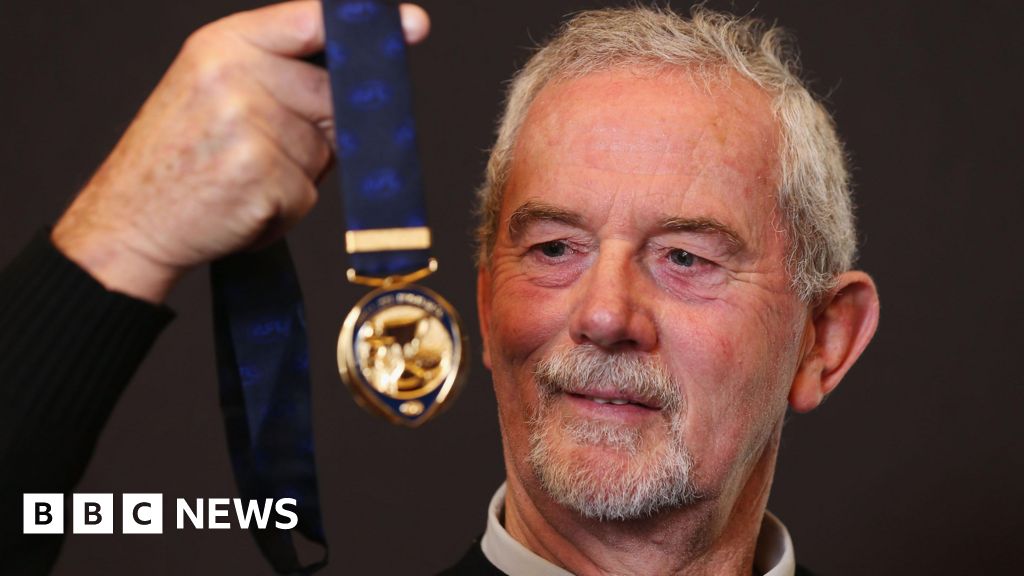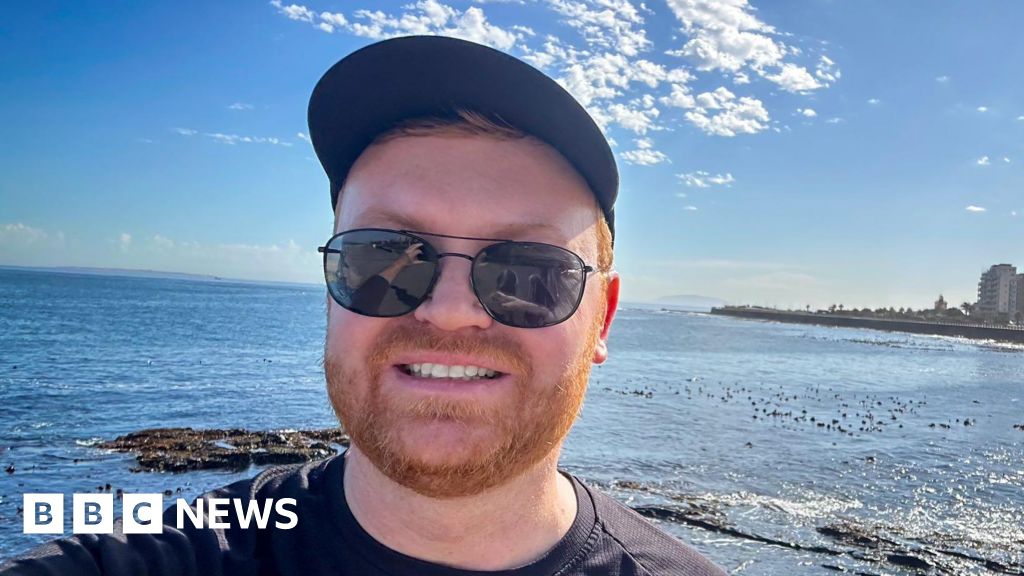ARTICLE AD BOX
By Tiffany Wertheimer
BBC News
Image source, Reuters
Image caption,The memorial at Babyn Yar is a significant landmark in Kyiv, and a place of pilgrimage for thousands of people every year
Jewish groups have condemned the bombing of a Holocaust memorial in Kyiv, which commemorates the murder of Jews by the Nazis in World War Two.
Babyn Yar was the site of one of the largest mass killings, where Jewish people were lined up and shot.
The memorial that sits there now is a special place for Ukraine and a significant landmark in its capital.
In a country with a large Jewish population and a Jewish president, the Russian attack is significant.
Warning: You may find some of the images below upsetting
Tuesday afternoon's missile attack, which also hit a nearby TV tower, killed five civilians. Staff at the memorial site have not been able to access it yet to see the true scale of the damage, but pictures show one of its museum buildings - which was not in use yet - on fire.
President Volodymyr Zelensky said it was "beyond humanity" and he also accused the West of not doing enough to prevent the attacks on his country.
"What is the point of saying 'never again' for 80 years, if the world stays silent when a bomb drops on the same site of Babyn Yar? At least 5 killed. History repeating..." he tweeted.
Image source, Babyn Yar Holocaust Memorial
Image caption,Pictures of what was to be part of the memorial's on-site museum shows the building on fire
The atrocities at Babyn Yar
Babyn Yar - also known as Babi Yar - is one of the largest World War Two mass graves in Europe. The massacre at the ravine on the outskirts of Kyiv took place over two days in September 1941.
As Ukraine's Jewish population fled the Nazi advance, a large population still lived in the city. Tens of thousands were told to assemble with spare clothes, on the assumption they would be sent to a labour camp, but they were then forced to undress and walk into the ravine, where they were shot by special killing squads.
According to the Nazis' own records, 33,771 Jews were killed over two days.
As the Holocaust continued, German forces continued to perpetrate horrendous crimes at Babyn Yar, using it as a mass grave to dispose of up to 100,000 bodies, until the Soviets took control of Kyiv again in 1943. As well as Jews, Roma, Ukrainian civilians and Soviet prisoners of war were also murdered there.
Later in the war, the retreating Germans bulldozed the ravine and burned the bodies in huge pyres to try to cover up their crimes.
Image source, Alamy
Image caption,The Nazis used Babyn Yar as a giant execution site in 1941-1943
The significance of Russia's attack
Babyn Yar is now a place of quiet contemplation, where thousands of people travel to every year to remember those who died. That it could be damaged or destroyed by an aggressive military attack goes against everything it stands for.
But the significance of this attack goes deeper.
"It is symbolic that [Russian President Vladimir Putin] starts attacking Kyiv by bombing the site of the Babyn Yar, the biggest Nazi massacre," said the chair of Babyn Yar's advisory board, Natan Sharansky.
Last week, Mr Putin called Ukraine's leaders "neo-Nazis" and said his goal was the "denazification" of the country.
Mr Sharansky said the Russian leader had sought "to distort and manipulate the Holocaust to justify an illegal invasion of a sovereign democratic country" in the "utterly abhorrent" move.
Yad Vashem, the Holocaust memorial museum in Israel, echoed this and called for an end to "abusing and distorting the memory of the Holocaust".
Ukraine's president is himself Jewish and his family suffered greatly under the Nazi regime.
Volodymyr Zelensky has often told his "story of four brothers" - his grandfather and three great-uncles - all of whom fought in the Soviet Army against Nazi Germany. Only his grandfather survived. The president was also closely involved in the creation of the memorial at Babyn Yar, Mr Sharansky said.
"Such a missile strike shows that for many people in Russia, our Kyiv is completely foreign. They know nothing about our capital. About our history," Mr Zelensky said after the attack.
"But they have an order to erase our history. Erase our country. Erase us all."
While official figures put Ukraine's Jewish population at 43,000, the European Jewish Congress believes it numbers at least 360,000.
Erasing history
The Soviets had tried to wipe out Babyn Yar's brutal history time and again, in an effort to suppress any mention of the atrocities committed against Jews, Mr Sharansky told the BBC.
"They physically tried to destroy these graves and delete the history, it's unbelievable how important it was for Soviets to change the nature of the place," he said.
A few years after the Nazis attempted to cover their own tracks, the Soviets tried to flood the ravine with mud. Then in the 1960s, they tried to build a sports stadium on the site. Mr Sharansky said the construction of the TV tower directly adjacent to the memorial in the 1970s was another attempt to "destroy the memory of the Holocaust".
"There were so many attempts to erase Babyn Yar and change its nature, finally we turned it into a big memorial, and that is once again overshadowed by Russian aggression," he said.
For decades under Soviet rule, there was little to mark the massacre site, except a simple obelisk that referred to "Soviet" victims, without mentioning the Jews, who were the main victims.
Finally, in the 1990s, a large Menorah monument was erected, when independent Ukraine decided to commemorate the Jewish victims. And last year a synagogue was opened.
Remembering Babyn Yar and Ukraine's forgotten 'Holocaust by Bullets'
Jewish groups and institutions were quick to condemn the missile strike.
"Rather than being subjected to blatant violence, sacred sites like Babi Yar must be protected," Yad Vashem said in a statement.
Israel's Foreign Minister, Yair Lapid, said on Twitter that his country would help to repair the damage to the site. And the Holocaust Memorial Day Trust in the UK said it was "shocked" and "horrified" to hear of the attack.
The loss of life in Ukraine today is our primary concern. We are also outraged at the damage inflicted on the Babyn Yar memorial by Russia’s attack today. #BabynYar was the site of one of the largest mass shootings during the Holocaust. It is sacred ground. Learn more.
— US Holocaust Museum (@HolocaustMuseum) March 1, 2022The BBC is not responsible for the content of external sites.View original tweet on Twitter

 3 years ago
41
3 years ago
41








 English (US) ·
English (US) ·